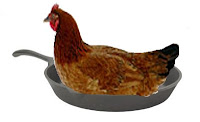Another “Tastes Like Chicken” Blog
Nothing gives me greater joy than seeing a brand, spanking-new grocery store opening up in the area. Here in our town, we’ve got two rather old and not so great stores to choose from: one offers great prices but not too much in the way of innovation while the other is a little newer, a little more upscale, but infinitely more expensive. (I have heard about the shopping Mecca referred to as Wegman’s and pray that someday they will move downstate so I can experience the wonder of this store. So far, nothing doing. ) So, as I drove home from a work visit the other day and saw a Stop and Shop with streamers wafting away from its brand new storefront, I nearly drove off the road. I was armed with a new recipe and decided that the time was right—despite the fact that the store had only opened seconds earlier—to give it a try.
I love food, think about food, eat a lot of food. And Thanksgiving is right around the corner, and I and my Stiletto gals have been talking about food in our emails back and forth to each other. (I still have to make Southern Evelyn’s apple cake, but promise I will!) I tend to stay toward healthy things and am constantly trying to amaze my family with my culinary prowess. If you’ve been reading this blog, you know that that is a challenge. I’ve got one picky eater, one vegetarian, and one who only likes a few vegetables and nothing really of the root variety, which I love to roast with olive oil, salt, pepper, and some herbs. But while drinking my coffee the other day—and with a great big thank you to Rachael Ray who published this recipe in my hometown newspaper—I seem to have hit on something that everyone loves (with the exception of the vegetarian who I have now turned onto breaded flounder, which can be picked up in the freezer case of the new Stop and Shop just inside the front doors of the building). Let me give you this one roaster, easy-as-pie chicken dinner that will take all of the guess work out of “Mom! What’s for dinner!?”
You will need:
To preheat the oven to 425 degrees.
One (1) whole cut-up chicken in a package. Take out all of the chicken, rinse and dry. I also cut the breasts in half so that they were more of the same size as the other pieces of meat. The chicken I bought cost about $9.00 and fed the family for three nights.
Get a bunch of fingerlings, red potatoes, purple potatoes, or any other kind of small potatoes that you like and wish to use. Cut them in quarters.
Strip the leaves of three stalks of rosemary and coarsely chop.
Crush eight garlic cloves.
Put the chicken on the bottom of the roaster, throw in the potatoes, the rosemary, the garlic, and cover the whole thing with a couple of tablespoons of olive oil. Oh, and don’t forget some sea salt and pepper to taste.
Stick in the oven for about 35-45 minutes or when the juices run clear from the chicken. You will have a one-roaster chicken dinner that everyone (sans the vegetarian) will enjoy. I also picked up one of my new favorite pre-packaged items: microwavable, steamable French beans. Served with the chicken and potatoes, you really have a winner. Tonight, we’re having the exact same dinner because I’ve never served a meal in which every morsel, down to the coarsely-chopped rosemary, was consumed. We may just eat this every night until Thanksgiving when I’ll probably break down and buy a couple of hamburgers so we don’t go on poultry overload.
I’m going to experiment a little tonight and roast some squash alongside the chicken even though I was admonished by the family not to change a thing. I figured I can doctor this up a few hundred ways and everyone will still enjoy.
Next week: a treat. We at the Stiletto Gang will be sharing additional recipes and ideas for the holidays and I, for one, am looking forward to seeing what the rest of my ladies have up their sleeves. Happy eating!
Maggie Barbieri






